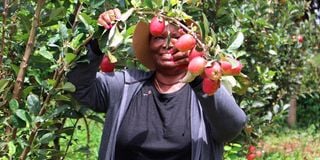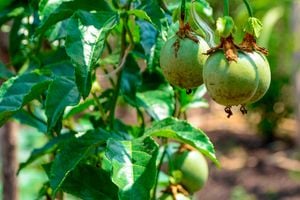
Rabecca Muli harvests apples at her two-acre farm near Salama township in Makueni County.
A simple Google search on the counties that produce apples in Kenya returns Kiambu, Kericho, Laikipia, Meru, Nandi, Nyandarua, Nyeri and Trans Nzoia.
However, a Nairobi businesswoman has moved to expand the list with a thriving orchard near Salama township, Makueni County.
Rabecca Muli, who has been operating the orchard for close to five years, has shattered a long held stereotype that apples cannot not thrive in the semi-arid Ukambani region.
Tens of townhouses dot either side of the Mombasa-Nairobi highway as one scales the winding Mlima Kiu Hills near Salama, distracting the Seeds of Gold team from locating the apple farm.
A resident then points to a black gate at the end of a murram road on inquiry.
“We took the decision to experiment with apples in 2020 after growing maize and beans for many years,” Muli says as she leads the visitors on a footpath through the trees sagging under the weight of mature and maturing apples.
“You can witness the experiment confirmed that Makueni, Machakos and even Kitui are ideal for the growing of mangoes, citrus fruits and even apples.”
With 400 mature apple trees in neat rows spread on two-acres, Muli is arguably the Ukambani apple queen.
A meshwork of intricate drip irrigation, which is linked to a solar-powered borehole, serves the orchard.
“This is Wambugu Apple,” Muli says, referring to a variety of apples developed by Peter Wambugu, a former motor vehicle mechanic who has since established an apple empire after grafting exotic varieties and the indigenous types found in the wild.
Ms Muli encourages visitors to pluck and eat the apples.
The fruits on her farm are crunchy and have a lingering tangy taste that many beverage makers now include in their products.
“A mature apple tree produces up to 800 fruits a year. A fruit fetches up to Sh40 in the market, depending on the prevailing forces of demand and supply,” Muli tells the Seeds of Gold team.
“However, proper management of the farm is important if one has to realise quality fruits big harvests.”
Whenever she is not running her other businesses in Nairobi, Muli is at her orchard.
She has hired three employees who help her manage the apple farm.
With time, Muli established that the management of apples starts with selection of disease-free seedlings.
She advises potential farmers to acquire clean planting materials from nurseries licensed by the Kenya Plant Health Inspectorate
Services as this greatly reduces the burden of managing pests and diseases.
Agronomists say apples do well in all types of soils, provided they are deep, fertile and well-drained.
They advise farmers to establish 2x2x2ft zai pits.
These pits should be filled with top soil, mixed with manure before introducing the apple seedlings.
The ideal spacing, according to agronomists, is two metres between plants and four metres between rows.
Apples are prone to attacks by aphids, spider mites and thrips. They are also affected by a shock caused by changes in weather patterns.
Muli has devised a regular spray programme to keep pests away from her apples.
The pests she has not bothered to control are birds. The businesswoman believes humans and birds need to share fruits.
“In any case, the birds only eat a tiny fraction of the fruits. They are also an important part of the ecosystem and it would not be advisable to kill them,” she says.
This leaves regular pruning and watering as the main management practices at Muli’s apple orchard.
She has established that pruning enhances fruit production.
Since the water she uses is mostly saline, Muli adds charcoal dust to the manure when filling the zai pits just before planting the seedlings as advised by agronomists. This neutralises the salinity.
Thanks to irrigation, Muli is guaranteed bountiful apple harvests all year round. This gives the fruits and the enterprise a competitive edge.
Muli markets her fruits by word of mouth and mostly on social media.
Fresh fruit vendors are her main customers. They make a beeline at the orchard to remain afloat in a market dominated by imports.
The businesswoman also sells a huge amount of her harvests to visitors who throng the orchard mainly on weekends to get information on the production of apples.
Her enterprise is the clearest testimony that with water and determination, Ukambani can be Kenya’s fruit Mecca and even the country’s breadbasket.









